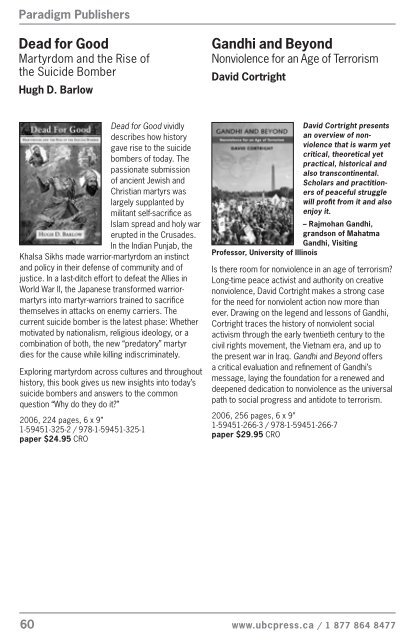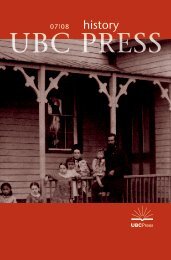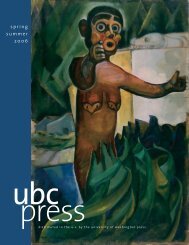In Search of Canadian Political Culture - UBC Press
In Search of Canadian Political Culture - UBC Press
In Search of Canadian Political Culture - UBC Press
You also want an ePaper? Increase the reach of your titles
YUMPU automatically turns print PDFs into web optimized ePapers that Google loves.
Paradigm <strong>UBC</strong> <strong>Press</strong>Publishers<br />
Dead for Good<br />
Martyrdom and the Rise <strong>of</strong><br />
the Suicide Bomber<br />
Hugh D. Barlow<br />
Gandhi and Beyond<br />
Nonviolence for an Age <strong>of</strong> Terrorism<br />
David Cortright<br />
Dead for Good vividly<br />
describes how history<br />
gave rise to the suicide<br />
bombers <strong>of</strong> today. The<br />
passionate submission<br />
<strong>of</strong> ancient Jewish and<br />
Christian martyrs was<br />
largely supplanted by<br />
militant self-sacrifice as<br />
Islam spread and holy war<br />
erupted in the Crusades.<br />
<strong>In</strong> the <strong>In</strong>dian Punjab, the<br />
Khalsa Sikhs made warrior-martyrdom an instinct<br />
and policy in their defense <strong>of</strong> community and <strong>of</strong><br />
justice. <strong>In</strong> a last-ditch effort to defeat the Allies in<br />
World War II, the Japanese transformed warriormartyrs<br />
into martyr-warriors trained to sacrifice<br />
themselves in attacks on enemy carriers. The<br />
current suicide bomber is the latest phase: Whether<br />
motivated by nationalism, religious ideology, or a<br />
combination <strong>of</strong> both, the new “predatory” martyr<br />
dies for the cause while killing indiscriminately.<br />
Exploring martyrdom across cultures and throughout<br />
history, this book gives us new insights into today’s<br />
suicide bombers and answers to the common<br />
question “Why do they do it?”<br />
2006, 224 pages, 6 x 9”<br />
1-59451-325-2 / 978-1-59451-325-1<br />
paper $24.95 CRO<br />
David Cortright presents<br />
an overview <strong>of</strong> nonviolence<br />
that is warm yet<br />
critical, theoretical yet<br />
practical, historical and<br />
also transcontinental.<br />
Scholars and practitioners<br />
<strong>of</strong> peaceful struggle<br />
will pr<strong>of</strong>it from it and also<br />
enjoy it.<br />
– Rajmohan Gandhi,<br />
grandson <strong>of</strong> Mahatma<br />
Gandhi, Visiting<br />
Pr<strong>of</strong>essor, University <strong>of</strong> Illinois<br />
Is there room for nonviolence in an age <strong>of</strong> terrorism?<br />
Long-time peace activist and authority on creative<br />
nonviolence, David Cortright makes a strong case<br />
for the need for nonviolent action now more than<br />
ever. Drawing on the legend and lessons <strong>of</strong> Gandhi,<br />
Cortright traces the history <strong>of</strong> nonviolent social<br />
activism through the early twentieth century to the<br />
civil rights movement, the Vietnam era, and up to<br />
the present war in Iraq. Gandhi and Beyond <strong>of</strong>fers<br />
a critical evaluation and refinement <strong>of</strong> Gandhi’s<br />
message, laying the foundation for a renewed and<br />
deepened dedication to nonviolence as the universal<br />
path to social progress and antidote to terrorism.<br />
2006, 256 pages, 6 x 9”<br />
1-59451-266-3 / 978-1-59451-266-7<br />
paper $29.95 CRO<br />
60<br />
www.ubcpress.ca / 1 877 864 8477













